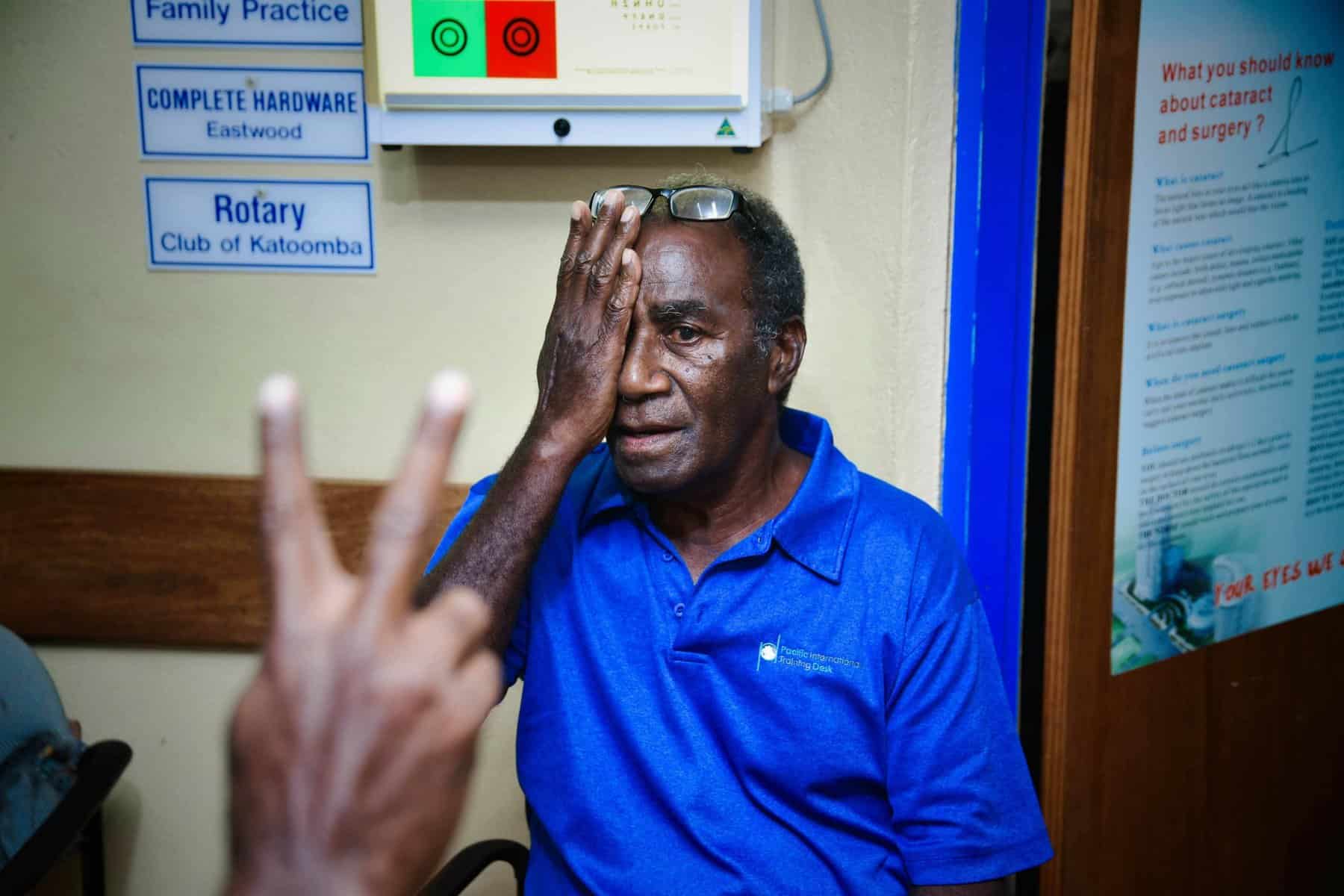The Vanuatu National Eye Centre in Port Vila has reached a zero-patient cataract backlog for the first time in several years. Supported by The Fred Hollows Foundation NZ in partnership with the Vanuatu Ministry of Health, this is a huge achievement for the National Eye Centre, which at one point had over 400 patients on its cataract backlog waiting to receive eye surgery.
Komal Ram, Senior Pacific Programme Manager for The Fred Hollows Foundation NZ, says, “The reduction of the backlog was primarily achieved by a Foundation-supported outreach, attended by ophthalmologists Dr Johnson Kasso and Dr Andronico Ly, with support from the Ministry of Health in Vanuatu, including the eye health nurses and registrars at the Eye Centre.”
Monique Tari, Senior Eye Nurse Practitioner at the National Eye Centre, says, “I want to acknowledge The Fred Hollows Foundation NZ for contracting Dr Andronico Ly and connecting him with Dr Kasso to support. Together they organised the clearing of the backlog and the resources and support, ensuring that all cataract patients were treated”.
Ms Ram says that the cataract backlog initially began in 2018 when there was only one eye doctor, Dr Johnson Kasso, servicing a population of approximately 300,000 scattered across Vanuatu’s 65 inhabited islands. Foundation-supported Regional Outreach Teams would travel to Vanuatu to assist the Vanuatu Ministry of Health to run outreaches at the National Eye Centre. However, due to the COVID-19 pandemic, these were paused for two years, further exacerbating the backlog issue.
Since then, several strides have been made in improving local eye care services, including a $2.5 million upgrade and expansion of the Vanuatu National Eye Centre in Port Vila in 2018, which helped to increase Vanuatu’s eye surgery capacity from 200 to 800 per year.
“Workforce training has also been a major focus. There are now 14 Foundation-sponsored eye nurse and eye care clinician graduates working in the country, and this year Dr Andronico Ly joined the team at the National Eye Centre as Senior Consultant Ophthalmologist. Previously employed as the Head of Department for Ophthalmology in Timor-Leste, Dr Ly now works alongside Dr Kasso, who leads the eye programme in the northern part of Vanuatu,” says Ms Ram.
Dr Ly says, “When I came to the National Eye Centre there were about 350 cataract patients waiting, which is a great number of people waiting for such simple, but important, sightrestoring surgery. With Dr Kasso and my team, we organised support from The Fred Hollows Foundation NZ and regional partners, to quickly reduce the backlog. At the National Eye Centre, we are all so happy that now people can walk in for cataract treatment, and they no longer have to wait – they get screened and have surgery immediately.”
With a zero-patient cataract backlog, patients can now be booked in for eye surgery without having to wait a long time from their initial consultation. This is especially important for conditions like diabetes eye disease which, if left untreated, can lead to irreversible vision deterioration and ultimately blindness.
The Vanuatu National Eye Centre’s journey from a sizeable cataract backlog to none is testament to the importance of building local capacity and investing in infrastructure. This achievement also arrives just in time for the country to undergo its first ever Rapid Assessment of Avoidable Blindness (RAAB) survey.
The RAAB survey, which The Foundation is running in partnership with the Vanuatu Ministry of Health, the New Zealand Ministry of Foreign Affairs and Trade, and the JN & HB Williams Foundation, will determine the burden of blindness and vision impairment in the country. It is widely used in the global eye sector, but this will be only the second of its kind to run in the Pacific.
For Vanuatu, the RAAB will involve four survey teams, comprised of Pacific eye doctors, nurses, and local community workers, surveying 5,675 people over the age of 50 from August to early October. In keeping with Professor Fred Hollows’ vision of ‘No Survey Without Service’, any patients identified as requiring treatment during the RAAB will be referred to the local eye clinic.
The resulting data will be key in delivering effective eye services for underserved people and communities. As well, with a better understanding of the burden of vision loss, Vanuatu and its partners will be better placed to advocate for, and build, national eye care plans.
ENDS
Media information
For interview requests or more information, please contact: Katie Moore, Communications Manager, kmoore@hollows.nz | 021 528 102
